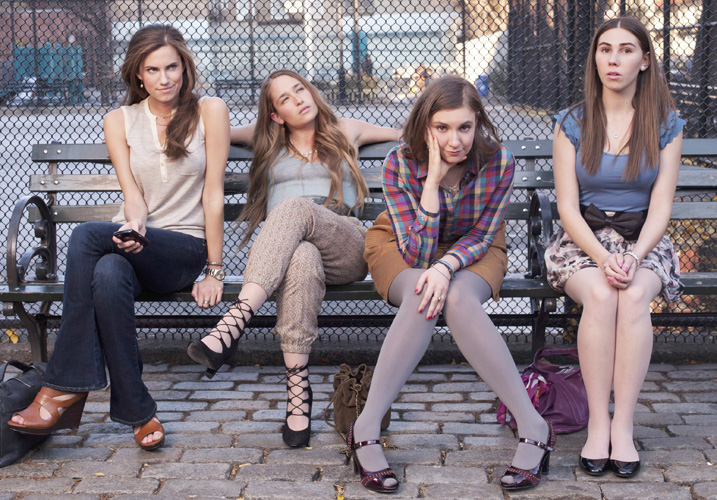The New ‘Sex and the City’

‘Girls’ feels real
by David Goldberg
Everyone’s got something to say about Girls. Lena Dunham’s upstart series about literate young ladies learning to navigate their post-collegiate 20s has arguably become this season’s most divisive premiere. But the talk is not for nothing. Girls is like nothing else on television.
The dramedy follows the misadventures of four young women at the slippery cusp of adulthood: Hannah (played by Dunham), whose intelligence does not help her judgment; Marnie (the luminous Allison Williams), who can manage her life perfectly but cannot dump her timid boyfriend; Jessa (Jemima Kirke), a transient idealist who delights in mischief; and Shoshannah (Zosia Mamet), a sweet J.A.P. who can’t seem to give it away. College has come to an end, and something else is about to begin—though what that is, nobody can say.
This series feels real. Many comparisons to Sex and the City have been made, and for obvious reasons: this sounds like just another show about four women living fabulous New York lives. But Lipstick Jungle and Cashmere Mafia it’s not. The characters do not function in a group. They do not sit at lunch and talk about their problems. Their issues do not resolve neatly by episode’s end. These girls just go through their day, episode by episode, and don’t have the contrived wisdom to make sense of it all. Sex and the City was a fantastic look at a group of women who can rule the world but can’t reconcile with their romantic lives. Girls is about a group of women who can’t reconcile with anything. It describes, as nobody has before, the experience of a generation that watched Sex and the City in high school yet never really learned a thing about sex—a generation that has had to reconcile with more mixed messages and confusion than any other. And, believe it or not, Gossip Girl does not really do us justice.
In the most recent episode, sweet virgin Shoshannah jumps into bed with a former friend from Camp Ramah. Shoshannah, in just her brassiere, barely survives foreplay. We see her Sex and the City poster hanging on the wall behind her, seemingly mocking her hopeless naiveté. There is no guidebook for what she is about to experience. This sexual encounter, like many others on the show, plays out more like a high school sex tape than an HBO scene. Rarely is the sex enjoyable for these girls: not because they don’t like it, but because they don’t know any better. They live in a socialized world in which more females graduate college than males, the girls study hard and seek companionship, and the boys smoke pot and don’t communicate.
In the third episode, Hannah meets with her former boyfriend to ask if he may have given her an STD. Before meeting him, she tells Shoshannah that he never got over her and probably still loves her. How wrong she is. Upon meeting him, she discovers that he now has a boyfriend named Beau and has been gay all along. It’s a devastating, hysterical, and all-too-common situation that nails the experience of the Girls girls: as they act out roles in relationships and life that they learned from a Sex and the City culture, they discover that they don’t know a thing at all.
Yes, the characters that the series follows are affluent, educated, and white—and yes, they’re probably too witty for their own good. But watch one episode of Girls and you’ll see more honesty and quality than on even the most diverse of series. Creator Lena Dunham has argued that while she will attempt to diversify her show, she will not toss in token characters to prove that she can.
Like it or not, Girls is touching the pulse of something. The series has captured some version of the American experience in an unprecedented way, and does not seem to be slowing down. As I watched the latest episode, I had an urge to move to New York City, like so many gay men before me did when they watched Sex and the City. But with Girls, I wanted to move to New York because of the reality, not the fantasy.
Girls airs Sundays at 9:30 p.m. on HBO (hbo.com).










